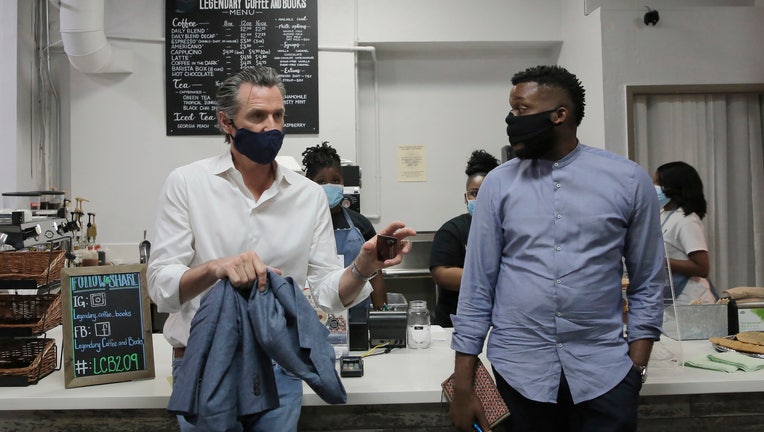Gov. Newsom says protests may lead to spike in virus cases

Gov Gavin Newsom, left, talks with Stockton Mayor Michael Tubbs during their stop at Legendary Coffee and Books in Stockton , Calif., Thursday, June 4, 2020. Newson and Tubbs met with the shops owner, Gwen Overton and other small business owners and
SACRAMENTO, Calif. - California Gov. Gavin Newsom said Thursday he's concerned about the spread of coronavirus as thousands of people gather for protests across the state, and he said the state should prepare for higher rates of positive tests because of both the protests and the reopening of businesses that's underway.
“If you're not (concerned), you're not paying attention to the epidemiology, to the virulence of this disease,” he said during a visit to Stockton, California, where he met with Mayor Michael Tubbs and business owners to discuss systemic racism and injustices. Newsom added he's particularly concerned about the disproportionate deaths from the virus among black Californians.
Still, California has no plans to halt its reopening efforts, though Newsom hasn't announced any new guidance for businesses this week.
Mark Ghaly, secretary of the California Health and Human Services agency, said the state is in a “range of stability” on cases and hospitalizations and is “working hard” on more guidance.
California has already allowed most counties to reopen restaurants, nail salons, churches and other businesses with restrictions. But highly anticipated guidance on schools has not been released, nor have details on the resumption of professional sports, possibly without fans.
Gov. Newsom says protests may lead to spike in virus cases
California Gov. Gavin Newsom said Thursday he's concerned about the spread of coronavirus as thousands of people gather for protests across the state and that the state should prepare for higher rates of positive tests as protests coincide with reopening for business.
Ghaly acknowledged it will be weeks before the effects of the protest on public health are fully known. He highlighted the “importance of the freedom and liberty to protest" but added, “it does create infectious disease concern that we weren't contending with before.”
Californians have taken to the streets to protest police brutality following the death of George Floyd, a Minneapolis man who pleaded for air as a police officer held his knee into Floyd's neck for more than eight minutes.
The developments have not appeared to change the reopening plans for counties as health officials continue to monitor virus cases. In Marin County, where reopening has been slower, officials recently allowed for outdoor retail and are looking into allowing indoor retail, said Laine Hendricks, a county spokeswoman. In Ventura County, officials this week announced that indoor malls can reopen.
Nearly 120,000 people have tested positive for the virus, with 2,120 new cases detected on Wednesday, according to state data. That's up less than 2% from the day before. Hospitalizations have gone slightly up in recent days, and more than 4,400 people have died.
Ghaly said increases in hospitalizations may be explained by hospitals recording positive cases in patients who have come in for elective or routine procedures.
Newsom noted the state's positive test rate has held steady around 4.5%, but he said the state should be prepared for that to rise and make sure hospitals and other care sites are ready. Black Californians account for about 5% of all positive cases but 10% of virus-related deaths.
For most people, the coronavirus causes mild or moderate symptoms, such as fever and cough. For some, especially older adults and people with existing health problems, it can cause more severe illness, including pneumonia and death. The vast majority of people recover.
In a new poll from the Public Policy Institute of California, 48% of people say the worst is yet to come from the virus while 46% say the worst is behind the state. Concern that the worst is yet to come is highest among black people, at 69%, and lowest among whites, at 41%. Just over half of Asian and Latino respondents say so.
More people are concerned about the state lifting restrictions too quickly than not quickly enough, according to the poll.
Hendricks of Marin County said officials expect to reopen sectors of the economy, then wait a couple of weeks to evaluate the impact before moving onward.
“If we start to see a surge in hospitalizations or a really rampant surge in cases, we will likely stop and assess,” she said.
“At this point, we're continuing to go forward."
___
Taxin reported from Orange County, California.

